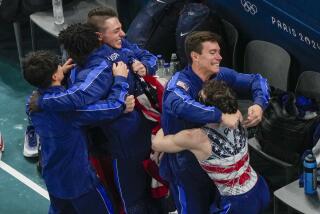U.S. Boxing Gets a Savior
- Share via
ATHENS — It has been eight years since a U.S. boxer stood on an Olympic podium to receive a gold medal. It has been six years since Andre Ward lost a fight.
Sunday afternoon, in the closing hours of the Athens Games, those two streaks collided in the ring of the Peristeri Olympic Boxing Hall.
After eight minutes of dancing feet, devastating left hooks and damaging right crosses, Ward emerged from his 179-pound final match against Magomed Aripgadjiev of Belarus victorious by a score of 20-13, having kept his personal streak alive and returned some glitter to his country’s bleak boxing program.
His right eye puffy and rapidly turning black and blue, but his smile intact, Ward blew a kiss to his deceased father, Frank, then took his place on the victory podium, where Muhammad Ali when he was Cassius Clay, Sugar Ray Leonard and George Foreman once had stood.
“I could have been a whole lot of different places now but God gave me the strength to be here,” the Oakland fighter said.
He was where no other American fighter had been since David Reid won a gold medal in the 1996 Olympics and, before him, Oscar De La Hoya in 1992.
“I felt like I had the whole country on my shoulders,” Ward said.
There was no one else to share the load. Only nine U.S. fighters had qualified for Athens and by the time Ward fought for gold, the eight others had been eliminated, only 165-pounder Andre Dirrell leaving with a medal, a bronze.
Had Ward failed to win gold, the U.S. would have equaled a low mark reached more than half a century ago. The U.S. went without gold in boxing in both the 1936 and ’48 Olympics, the Games not held in the interim because of World War II.
To avoid a repeat, Ward had to get past an opponent who had finished second in the light-heavyweight division at last year’s world championships.
Sunday’s fight began slowly, the fighters looking for some vulnerability.
Ward trailed, 4-3, after the first round and 9-7 after two, an ominous trend for the American because the fighters who have fallen behind in these four-round Olympic bouts have had great difficulty catching up.
For Ward, there was an even more ominous development. Aripgadjiev poked Ward in his right eye with a thumb toward the end of the second round.
“I had double vision after that,” Ward said. “I had never had that happen to me before. My first reaction was to take a knee. It took me a while to clear my head.”
Instead of taking a knee and clearing his head, Ward rocked Aripgadjiev’s head and sent the 26-year-old fighter to his knees with a left hook in the third round. It was not ruled a knockdown by referee Montero Gerardo, but Ward didn’t care.
“You only get credit for one punch, whether it was a knockdown or not, so I don’t worry about that,” he said.
Instead, Ward came out of his shell and leveled a barrage of punches at Aripgadjiev.
“I realized, by the third round, that I was faster than him,” Ward said, “All I had to do was let my hands go, be myself and relax.”
Ward outscored Aripgadjiev, 13-4, over the final two rounds to assure his victory.
“I was lagging behind over the last few rounds,” Aripgadjiev said. “I felt he was quicker than I was, had good footwork and was very accurate.”
With the final bell, Ward had won the final American gold of the Games, the 35th in all.
“I’m numb,” he said. “I really have no emotions. When you are focused on something for so long, and then you get it, it takes time to come down from that high.”
More to Read
Go beyond the scoreboard
Get the latest on L.A.'s teams in the daily Sports Report newsletter.
You may occasionally receive promotional content from the Los Angeles Times.






